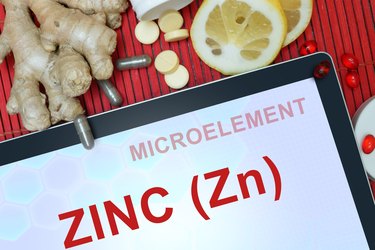
By eliminating meat, fish, poultry and all animal products from their diets, vegans can experience unwanted side effects related to hormone imbalances. Although they avoid the hormones found in some meat and dairy products, vegans tend to eat higher than average amounts of hormone-like compounds in plant foods. The nutritional content and health effects of vegan diets can both boost and lower testosterone levels. However, as long as you eat a balanced diet that includes adequate amounts of carbohydrates, protein, and zinc, eating a vegan diet should not lower your testosterone levels.
Soy Isoflavones
Video of the Day
Soybeans and soy products are among the highest-quality protein sources available for those following a vegan diet. Despite their nutritional benefits for vegans, these products contain estrogen-like compounds called soy isoflavones. As testosterone levels can be affected by levels of other hormones in the body, a common misconception is that a high intake of soy isoflavones can lead to lower levels of testosterone. However, a literature review by the Linus Pauling Institute indicates that soy intake does not necessarily boost estrogen levels, while a meta-analysis by Jill Hamilton-Reeves. Ph.D. and Mark Messina, Ph.D. showed that soy isoflavone intake has no effect on testosterone levels.
Video of the Day
Protein and Carbohydrates
The official position of the Academy of Nutrition and Dietetics is that a balanced vegan diet can provide adequate amounts of protein. Despite this, AND suggests that vegan diets typically are not as high in protein as vegetarian and omnivorous diets. According to Dr. Michael P. Muehlenbein, low testosterone levels are common in people who eat less protein. This is one way in which a vegan diet might reduce testosterone levels. However, vegan diets also tend to be higher in carbohydrates, which Dr. Muehlenbein suggests might help increase testosterone levels. Whether or not this is true of your vegan diet, always try to eat adequate amounts of protein and carbohydrates to avoid any unwanted reduction in your testosterone levels.
Zinc
Although a balanced vegan diet can provide adequate amounts of most nutrients, AND indicates that insufficient zinc intake is common among vegans. Too little zinc in your diet can result in a reduction of your body's ability to produce testosterone, potentially resulting in lower testosterone levels. To help avoid this, increase your intake of zinc-rich foods such as soy, legumes, grains and nuts. The body has difficulties absorbing all of the zinc in these foods because of their high phytic acid content, so always pair these foods with citrus fruits, as citric acid increases the body's ability to absorb vegan sources of zinc.
Obesity
According to AND, vegans typically have a lower body mass index and are at a lower risk of developing obesity than those following omnivorous diets. Vegans tend to have less body fat than non-vegans. Testosterone stored in body fat can be converted to estrogen through a process called aromatization. Although other factors might also play a role, this process contributes to people who live with obesity generally having lower than average testosterone levels. Through this indirect process, a vegan diet can potentially help you avoid a reduction in testosterone levels.
- New York University Langone Medical Center: The Controversy Over Added Hormones in Meat and Dairy
- Soy Connection: Testosterone Levels Not Affected By Soy Protein, Isoflavones
- Linus Pauling Institute: Soy Isoflavones
- Journal of the American Dietetic Association; Position of the American Dietetic Association: Vegetarian Diets